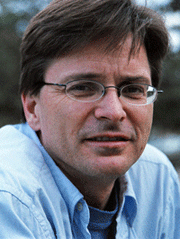That might sound arrogant, but it is born more of desperation than arrogance. I don't contend to have THE analysis. But I believe we are in a period in which traditional ways that liberal/progressive/left forces have understood the world are inadequate. If we continue to pursue strategies based in those understandings, we will lose. Standing here today, I can't tell you that I know how we can win, or even that we can win. But I can be part of a conversation to try to shift the course onto a winning strategy, and in the course of that conversation we can demonstrate that we should win.
The first, and perhaps most important, move is to recognize that we humans long ago outstripped our ability to fully understand and control the consequences of our actions. The crises we find ourselves in today are largely the product of social systems and technological advances that have moved far past the point we can control them. In the words of Wes Jackson, a sustainable-agriculture researcher and philosopher of science, we have fallen prey to our belief that human knowledge is adequate to run the world. That is a dangerous thing, especially in this complex world of nation-states and stateless armed forces, this world in which the forces of nature have been distorted by our meddling in creation in ways we have never fully understood.
So, step one: Let's recognize our ignorance. Recognize that as a species we are clever but generally not wise, that our intelligence is not deep enough to pull off this attempt to control the world.
That is a tall order for us. It requires a hope that balances humility and harshness. We have to be kind to ourselves and to one another, and yet brutally honest at the same time. Perhaps we will have to go beyond harsh to become ruthless in our hope. I want to quote from one of the Western world's most well-known philosophers and social critics, who saw this at an early age. In a letter to a friend, a 25-year-old Karl Marx wrote:
"[T]here can still be no doubt about the task confronting us at present: the ruthless criticism of the existing order, ruthless in that it will shrink neither from its own discoveries, nor from conflict with the powers that be."
It is not unusual for radicals to exhort us to confront power. More interesting is the other part of Marx's statement: We must not shrink from our own discoveries. This is the need for deeper analysis of which I have been speaking. The need to shake off dogma, to refuse to hide in the assumptions that provide some comfort in this broken world. The need to be ruthlessly honest about the systems and institutions in which we live. If we are to have hope, honestly, there is no other choice.
What are those discoveries? I think the most important ones concern the nature of the systems and institutions in which we live. It is tempting to want to blame our problems on individuals. That would be a fatal error at this point. In other words:
--The problem is not simply George W. Bush and the gang of thugs who gave us the Afghanistan and Iraq debacles. The problem is the brutality of empire.
--The problem is not simply Ken Lay and the bad boys of Enron, but the inhuman nature of corporate capitalism.
--The problem is not simply sex and violence on television, but the fact that television is on, always on, in so many homes.
--The problem is not simply the overt racism of the Ku Klux Klan but the polite ways in which we nice liberal white folks can so easily avoid the realties of how white supremacy is deeply woven into the fabric of this society.
--The problem is not simply the men who rape but the men who let them rape without consequence.
--The problem is not simply the greed and stupidity of Donald Trump but the greed and stupidity of us all.
Being lovingly ruthless is not easy. For the past decade, I have been slowly trying to come to terms with my own discoveries, and this is hard. They are discoveries of the extent to which this world is broken, why it is broken, and how it has broken me.
(Note: You can view every article as one long page if you sign up as an Advocate Member, or higher).





